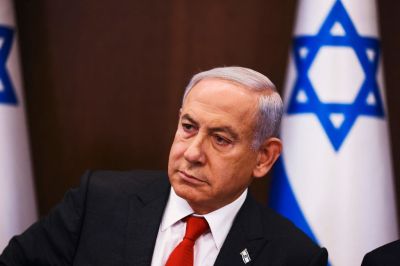Benjamin Netanyahu hopes his sixth term as Israel’s prime minister will bring what would be his crowning diplomatic achievement to date: normalized relations with Saudi Arabia. Such a move would usher in a period of strategic and economic cooperation between the two Middle East powers amid growing aggression from Iran, Russia, and China.
But orchestrating a deal between the Islamic kingdom and the world’s lone Jewish state may hinge more on Washington than worldview: Recent feuding between the Biden administration and Riyadh, along with unruly factions within Netanyahu’s own government, threaten to derail U.S. support for a historic accord.
American engagement will be crucial to striking a deal. The U.S. has helped broker every major Arab-Israeli peace deal since the 1979 Camp David Accords with Egypt. Most recently, Netanyahu worked with the Trump administration to reach landmark normalization agreements between Israel and the United Arab Emirates, Bahrain, Morocco, and Sudan. But as Netanyahu’s new term begins, he says American engagement is lacking.
“[America’s] traditional alliance with Saudi Arabia and other countries, has to be reaffirmed,” Netanyahu said shortly before taking office. “There should not be periodic swings, or even wild swings in this relationship, because I think that the alliance between America’s allies and with America is the anchor of stability in our region.”
President Joe Biden got off to a rocky start with Saudi Arabia—and its de facto leader, Crown Prince Mohammed bin Salman (MBS)—deeming the country a “pariah” over its poor human rights record in 2019 and lifting Yemen Houthis’ terrorist designations during his first days in office. But after Russia invaded Ukraine and sparked an increase in energy prices, voices within the administration pushing for a more pragmatic approach to the world’s foremost oil supplier won out. Biden famously fist-bumped MBS during a midsummer trip to the Red Sea port city of Jeddah (much to the dismay of fellow Democrats), and Saudi Arabia agreed to open its airspace to flights from Israel—a meaningful step toward normalization.
But any goodwill that came from the president’s Middle East tour evaporated a few months later when the Saudi-led Organization of Petroleum Exporting Countries and its allies (OPEC+) announced plans to cut oil output by 2 million barrels per day, raising the specter of price hikes ahead of the U.S. midterm elections. Biden administration officials accused the bloc of “aligning with Russia,” and congressional Democrats called for a one-year ban on arms sales to the kingdom.
“The Saudis were really very upset about what they thought was kind of a hysterical U.S. overreaction to the OPEC+ decision,” John Hannah, a senior fellow at the Jewish Institute for National Security of America and a former national security advisor to Vice President Dick Cheney, said in an interview. “They thought that the knee-jerk reaction of the administration to immediately go public again and say that they were going to impose consequences on the Saudis, that they were going to re-evaluate and re-examine the relationship, was very problematic.”
That’s the backdrop for Saudi Arabia’s big opening demands in exchange for normalizing ties with Israel. Riyadh has conveyed three requests to the White House, individuals who have been briefed by Saudi officials say.
First, MBS wants a written assurance of American support if the kingdom is attacked. Saudi officials are wary of the U.S.’s commitment to its Gulf state partners after a wave of drone and missile attacks on the UAE by the Iranian-backed Houthis elicited very little response from Washington. It’s unclear whether the Saudis want a more informal agreement or a treaty requiring Senate approval, but the latter would be a near-impossible ask.
Given past congressional efforts to impede arms transfers to Saudi Arabia—which relies on American suppliers for some of its most basic national defense needs—Riyadh has also called for a deal to establish more “predictability” in the sales. Absent that, it appears to be considering taking its business elsewhere. Last month the kingdom formalized plans to strengthen its military and security cooperation with the United Kingdom, with Saudi Defense Minister Khalid bin Salman personally touring BAE Systems’ headquarters in Lancashire.
The final request pertains to Saudi Arabia’s civil nuclear power industry, which it sees as critical to diversifying its economy away from oil. Riyadh wants to leave the door open for future enrichment activity (not just importation), citing vast natural uranium reserves.
Notably absent from Saudi Arabia’s list of demands is mention of the Palestinians, suggesting that Saudi officials have moved away from Palestinian statehood as a precondition to normalization with Israel. But that’s not to say it won’t be a consideration. As the birthplace of Islam and custodian of Mecca and Medina, Saudi Arabia considers itself the leader of the Muslim world—an image that playing nice with Israel could undermine at home and abroad.
The far-right makeup of the new Israeli government, which many have deemed as anti-Arab, further complicates the optics for Riyadh.
In order to form a majority in Israel’s parliament and return to the premiership, Netanyahu had to strike deals with religious conservative and ultranationalist blocs, including Itamar Ben-Gvir’s Otzma Yehudit, “Jewish Power,” party. The same contingents that helped bring Bibi back to Israel’s helm also threaten to undermine his goal of establishing diplomatic ties with the Saudis.
It took just five days for the new government to create rifts with Arab neighbors. In Ben-Gvir’s first public act as national security minister last week, the far-right party leader walked through Jerusalem’s most coveted—and most contested—holy site in what Palestinians decried as a deliberate provocation.
Surrounding Islamic countries joined the chorus of condemnations, with Egypt, Jordan, and the United Arab Emirates—each of which enjoy diplomatic relations with Israel—accusing Ben-Gvir of “storming” Al-Aqsa mosque. Saudi Arabia denounced the visit as “provocative.”
The Arab world’s strong reaction to Ben-Gvir’s Temple Mount tour afforded an early look into the domestic challenges facing Netanyahu on his quest for Saudi normalization.
“The actions of right-wing partners within Netanyahu’s coalition will significantly complicate—and likely delay—his efforts to engage with Arab neighbors,” said Norman Roule, a former Middle East expert at the CIA. “Netanyahu must now undertake a challenging balancing act in which he supports the demands of these partners sufficiently to retain their support, while seeking to shape and even deter their actions to avoid the inevitable diplomatic blowback from angry Arab partners.”
But with Netanyahu’s sway in Washington and history of brokering similar agreements, he could be the person to pull off the impossible. Such an achievement would bring political clout for Bibi but also a safer, more prosperous region overall, allowing the two U.S. partners to strengthen their intelligence and security cooperation as they face a common foe in Iran.
“Biden doesn’t want a fight with the Israelis if he can avoid it. I think he will give Netanyahu a fair hearing,” said Hannah. “If he can manage to contain some of the more controversial antics of his right-wing coalition partners so as not to create major distractions in the U.S.-Israel relationship surrounding the Palestinians or other issues, he should be able to make a difference at the margins in Washington on the Saudi normalization question.”







Please note that we at The Dispatch hold ourselves, our work, and our commenters to a higher standard than other places on the internet. We welcome comments that foster genuine debate or discussion—including comments critical of us or our work—but responses that include ad hominem attacks on fellow Dispatch members or are intended to stoke fear and anger may be moderated.
With your membership, you only have the ability to comment on The Morning Dispatch articles. Consider upgrading to join the conversation everywhere.